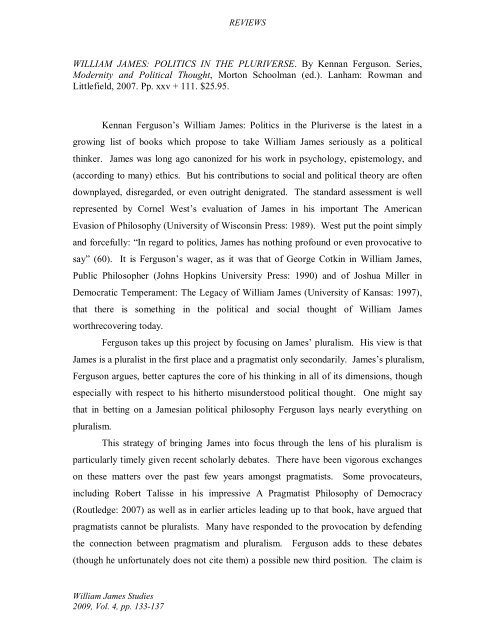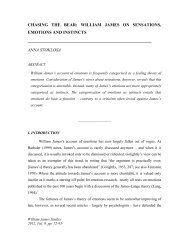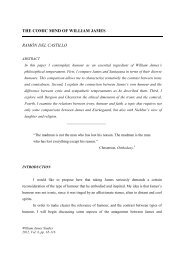POLITICS IN THE PLURIVERSE. By Kennan Ferguson
POLITICS IN THE PLURIVERSE. By Kennan Ferguson
POLITICS IN THE PLURIVERSE. By Kennan Ferguson
Create successful ePaper yourself
Turn your PDF publications into a flip-book with our unique Google optimized e-Paper software.
William James Studies<br />
2009, Vol. 4, pp. 133-137<br />
REVIEWS<br />
WILLIAM JAMES: <strong>POLITICS</strong> <strong>IN</strong> <strong>THE</strong> <strong>PLURIVERSE</strong>. <strong>By</strong> <strong>Kennan</strong> <strong>Ferguson</strong>. Series,<br />
Modernity and Political Thought, Morton Schoolman (ed.). Lanham: Rowman and<br />
Littlefield, 2007. Pp. xxv + 111. $25.95.<br />
<strong>Kennan</strong> <strong>Ferguson</strong>’s William James: Politics in the Pluriverse is the latest in a<br />
growing list of books which propose to take William James seriously as a political<br />
thinker. James was long ago canonized for his work in psychology, epistemology, and<br />
(according to many) ethics. But his contributions to social and political theory are often<br />
downplayed, disregarded, or even outright denigrated. The standard assessment is well<br />
represented by Cornel West’s evaluation of James in his important The American<br />
Evasion of Philosophy (University of Wisconsin Press: 1989). West put the point simply<br />
and forcefully: “In regard to politics, James has nothing profound or even provocative to<br />
say” (60). It is <strong>Ferguson</strong>’s wager, as it was that of George Cotkin in William James,<br />
Public Philosopher (Johns Hopkins University Press: 1990) and of Joshua Miller in<br />
Democratic Temperament: The Legacy of William James (University of Kansas: 1997),<br />
that there is something in the political and social thought of William James<br />
worthrecovering today.<br />
<strong>Ferguson</strong> takes up this project by focusing on James’ pluralism. His view is that<br />
James is a pluralist in the first place and a pragmatist only secondarily. James’s pluralism,<br />
<strong>Ferguson</strong> argues, better captures the core of his thinking in all of its dimensions, though<br />
especially with respect to his hitherto misunderstood political thought. One might say<br />
that in betting on a Jamesian political philosophy <strong>Ferguson</strong> lays nearly everything on<br />
pluralism.<br />
This strategy of bringing James into focus through the lens of his pluralism is<br />
particularly timely given recent scholarly debates. There have been vigorous exchanges<br />
on these matters over the past few years amongst pragmatists. Some provocateurs,<br />
including Robert Talisse in his impressive A Pragmatist Philosophy of Democracy<br />
(Routledge: 2007) as well as in earlier articles leading up to that book, have argued that<br />
pragmatists cannot be pluralists. Many have responded to the provocation by defending<br />
the connection between pragmatism and pluralism. <strong>Ferguson</strong> adds to these debates<br />
(though he unfortunately does not cite them) a possible new third position. The claim is
REVIEWS 134<br />
neither the bristling challenge that pluralism undermines pragmatism nor the standard<br />
view that pluralism flows from pragmatism, but rather the sensible idea that pluralism can<br />
proceed where pragmatism is not already in place in such a way as to prepare us for the<br />
latter.<br />
<strong>Ferguson</strong>’s book opens in Chapter One with a recounting of James’s visit to the<br />
utopian community of Chautauqua in upstate New York. James recognized in<br />
Chautauqua an American iteration of sweetness and light. But flowing out of those<br />
perpetually running soda water fountains was a slow and steady decay. With everything<br />
so well prepared for the visitor, there was nothing for the visitor to do except to atrophy<br />
into a readymade routine. <strong>Ferguson</strong> suggests that we find the paradigmatic motivation<br />
for James’s pluralism in his reaction against the hotel world of Chautauqua where<br />
struggle is not only unnecessary but also impossible.<br />
This sets the stage for the end of Chapter One and Chapter Two where <strong>Ferguson</strong><br />
contrasts Jamesian pluralism to contemporary liberal pluralism. This is the core of the<br />
book for it is here that we find the crux of <strong>Ferguson</strong>’s interpretation of James’s politics<br />
and the contribution it can make to political theory today: “liberal pluralism and James’s<br />
radical pluralism are distant cousins” (9). At the core of <strong>Ferguson</strong>’s contrast here is an<br />
interpretation of contemporary liberalism as a theory that accepts plurality but with the<br />
goal of subsuming it within greater unity. Is this an accurate interpretation of liberalism<br />
today?<br />
If <strong>Ferguson</strong> is right that contemporary liberals countenance pluralism only as a<br />
descriptive fact to be overcome by a wider norm of political unity, then surely James<br />
helps us go beyond this. But we should consider at this point exactly what part of such a<br />
liberalism James presses past. <strong>Ferguson</strong> suggests that James moves past the descriptive<br />
pluralism of the liberal in that he not only describes pluralism but more importantly<br />
prescribes it (cf. 10, 15ff.). Yet I find it tough to see how anyone could coherently<br />
prescribe pluralism: for there are always doctrines which demand the cessation of some<br />
other doctrines (e.g., evangelism towards atheism) and so prescribing pluralism requires<br />
ruling such doctrines out, even though pluralism was supposed to rule nothing out, but<br />
invite all in (this, by the way, is also Talisse’s argument).
REVIEWS 135<br />
Another option is to see James not as moving beyond liberalism descriptivism<br />
about pluralism but rather only the liberal attempt to subsume of pluralism in a higher<br />
unity. Rawls’s liberalism professes to describe a fact of “reasonable” pluralism, but a<br />
better name may have been “shallow” pluralism. James, by contrast to Rawls but in<br />
anticipation of later liberals like Isaiah Berlin, accepts the irreducible fact of “deep”<br />
pluralism. One need not prescribe deep pluralism to descriptively accept it as an<br />
unavoidable condition of our political modernity. James can thus be seen as rejecting any<br />
liberal attempt to subsume plurality in a greater unity without being seen as prescribing<br />
pluralism. This raises the possibility that perhaps <strong>Ferguson</strong> attributes to liberalism a view<br />
which describes only some, but certainly not all, liberals.<br />
If the core issue at stake in Jamesian versus liberal pluralism is not that of<br />
prescriptivism and descriptivism, but rather that of subsuming plurality under unity then<br />
we ought to assess <strong>Ferguson</strong>’s interpretation of liberalism in terms of this issue. I find<br />
<strong>Ferguson</strong> insightful in his diagnosis of a prevalent “statism” in contemporary liberal<br />
theory according to which liberal pluralists aim to subsume plurality under the unity of<br />
the state. But does this diagnosis really extend to all liberal pluralists? It surely describes<br />
the liberal pluralism of John Rawls and the tidal wave of work which it washed in. But<br />
does it capture Isaiah Berlin, Bernard Williams, Amartya Sen, and Martha Nussbaum as<br />
precisely as it does Rawls? Does it even come close to describing John Dewey?<br />
<strong>Ferguson</strong> seems to suggest as much. But I worry that liberalism is here being painted<br />
with too big a brush. This little review is not the appropriate venue for a pointillist<br />
rendering of liberalism in enormous detail, so let me just register a worry that some may<br />
have about <strong>Ferguson</strong>’s argument: liberalism for some is sufficiently capacious to<br />
accommodate Jamesian pluralism as <strong>Ferguson</strong> develops it. If this is correct, then<br />
Jamesian pluralism is perhaps not an alternative solution to the ills of liberalism so much<br />
as a statement of the work that liberalism now ought to engage itself in and, in the case of<br />
at least a few contemporary theorists, is already attempting. James’s pluralism is perhaps<br />
a viable path forward, but I think it unnecessary and unpragmatic (in the colloquial sense)<br />
to suggest that it is an anti-liberal path. So here is a suggestion: replace “liberalism” with<br />
“statism” in <strong>Ferguson</strong>’s argument and there you have a nice liberal pluralist argument<br />
against liberal statism.
REVIEWS 136<br />
Any pluralist, statist, liberal, pragmatist, or Jamesian who cares about these<br />
important matters will benefit from the questions <strong>Ferguson</strong>’s book raises as well as the<br />
answers it proposes. This book further repays reading in that it offers interventions into<br />
other debates of interest to we who read, interpret, and love the work of William James. I<br />
have here focused almost exclusively on <strong>Ferguson</strong>’s centermost themes of the pluralism<br />
made available by James, but there are indeed other worthy topics broached in these<br />
pages. One is the interconnection between James’s philosophy and politics in terms of<br />
his recpriocal pluralism and anti-imperialism (Chapter Three). Another is the Jamesian<br />
pluralization of the role of sovereignty in international affairs (Chapter Three). Another<br />
theme engaged with particular ability in the book concerns the relation between<br />
Pragmatist and Continental Philosophy as anticipated by the invigorating interchange<br />
between William James and Henri Bergson at the beginning of the twentieth century<br />
(Chapter Four). As this last issue has gained some interest in recent scholarship, I will<br />
conclude with a brief consideration of <strong>Ferguson</strong>’s treatment here.<br />
<strong>Ferguson</strong> aims to contest the familiar narrative that recent American ‘theory’<br />
takes its antifoundationalist aspirations over from French ‘postmodern’ thought. He<br />
favors an alternative narrative according to which French pomo-ism is itself a borrowing<br />
from an earlier iteration of American pragmatism-cum-pluralism. The birth of<br />
antifoundationalism in recent intellectual discourse is thus actually a rebirth of an<br />
originally American, or at least originally Jamesian, contribution. <strong>Ferguson</strong> uses the<br />
interchange between James and Bergson to make his point. He concludes that, “The<br />
connections between the two thinkers, their mutually constituted recognition that truth<br />
and thought often have lacunae between them, echo throughout the century that followed<br />
them” (61). But in tracing this mutual influence <strong>Ferguson</strong> moves much too quickly to<br />
satisfy the intellectual historian. He also neglects the work of other intellectual historians<br />
on related matters, most notably Chapter Three of James Livingston’s Pragmatism,<br />
Feminism, and Democracy (Routledge: 2001).<br />
The lines of influence between James and Bergson which <strong>Ferguson</strong> traces should,<br />
he concludes, serve as cautions against interpretations of philosophy that are<br />
“intrinsically ahistorical” such that they “reinforce boundary disputes within philosophy<br />
rather than investigate what seemingly difference branches can say to one another” (64).
REVIEWS 137<br />
<strong>Ferguson</strong> is himself as Jamesian as one can get in offering this point. He is asking us to<br />
not close off our philosophies to one another, but to let them interact to see what we<br />
might make of such engagements across the divide. This restates the pluralistic message<br />
of the book in a context where it very much needs to be heard.<br />
Colin Koopman<br />
Department of Philosophy<br />
University of California, Santa Cruz<br />
cwkoopman@gmail.com




